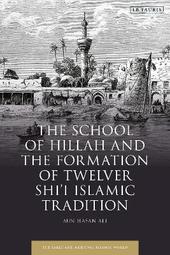
|
The School of Hillah and the Formation of Twelver Shi'i Islamic Tradition
Hardback
Main Details
| Title |
The School of Hillah and the Formation of Twelver Shi'i Islamic Tradition
|
| Authors and Contributors |
By (author) Aun Hasan Ali
|
| Series | Early and Medieval Islamic World |
|---|
| Physical Properties |
| Format:Hardback | | Pages:288 | | Dimensions(mm): Height 234,Width 156 |
|
| Category/Genre | Islamic life and practice |
|---|
| ISBN/Barcode |
9780755639083
|
| Audience | | Tertiary Education (US: College) | |
|---|
|
Publishing Details |
| Publisher |
Bloomsbury Publishing PLC
|
| Imprint |
I.B. Tauris
|
| Publication Date |
13 July 2023 |
| Publication Country |
United Kingdom
|
Description
Against the background of long-standing narratives in which Twelver Shi'ism is viewed as fundamentally authoritarian, The School of Hillah and the Formation of Twelver Shi'i Islamic Tradition builds upon recent scholarship in the fields of Religious Studies, Anthropology, and History to argue that Twelver Shi'ism is better understood as a discursive tradition. At a conceptual level, this solves the basic problem of how to integrate the extraordinary diversity of Twelver Shi'ism across time and space into a single historical category without engaging in a normative assessment of its underlying essence. Furthermore, in light of this conception of tradition, the School of Hillah stands out as a seminal period in the archive of Twelver Shi'ism, though it has seldom been recognized as such in European-language scholarship. Insofar as it gave birth to a conversation that would prove capable of encompassing the dynamism of Twelver Shi'ism, the School of Hillah should be considered the formative period of Twelver Shi'i tradition. Moreover, when the tradition is conceptualized in this manner, it is a bulwark against the very authoritarianism by which Twelver Shi'ism has been characterized for so long. Aun Hasan Ali applies the techniques of social network analysis to bio-bibliographical sources to reveal the school of Hillah as a formative period where outstanding and landmark works were written in practically every field of classical Islamic scholarship. He uses state-of-the-art electronic databases to study the transmission of knowledge and networks of kinship, learning, and patronage to show the way that the school was socially, politically and historically embodied, covering over 200 individuals and their writings. In the process, he reveals the way that Imami Shi'ism emerged in a historically specific and interfaith dynamic, becoming a discursive tradition unified and sustained by disagreement and an awareness of its minority status.
Author Biography
Aun Hasan Ali is Assistant Professor of Islamic Studies, University of Colorado Boulder, USA. He is the author of articles in peer-review journals such as Islamic Studies, Turkish Journal of Shiite Studies and has contributed to The Oxford Encyclopedia of Islam and Law and edited collections.
ReviewsProfessor Ali's book is a mammoth undertaking that interrogates the archival record to meticulously trace the relationships that existed between scholars and their texts. By recentering Hillah (from the twelfth to fourteenth centuries) as a key site for the formation of Twelver Shi?ism, he demonstrates the ways in which the intellectual tradition that flourished in this city continues to impact our understanding of Twelver Shi?ism until today * Associate Professor Nebil A. Husayn, University of Miami *
|